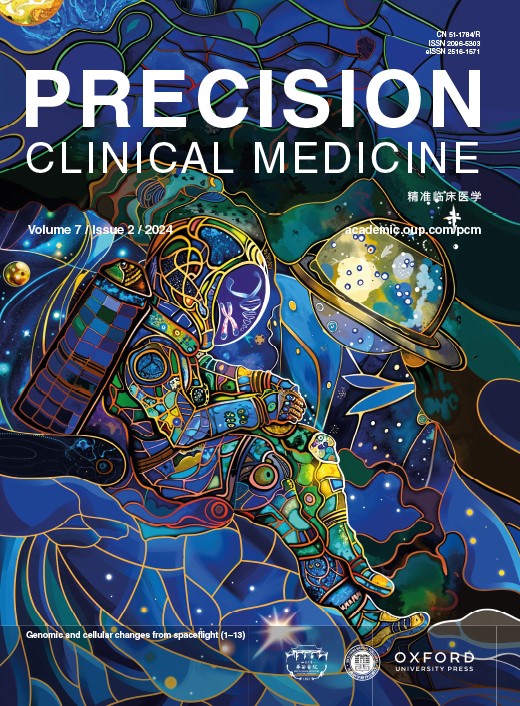Blockade of integrin signaling reduces chemotherapy-induced premature senescence in collagen cultured bladder cancer cells
IF 5.1
4区 医学
Q1 MEDICINE, RESEARCH & EXPERIMENTAL
引用次数: 3
Abstract
Abstract Background Diminished sensitivity towards chemotherapy remains the major impediment to the clinical treatment of bladder cancer. However, the critical elements in control of chemotherapy resistance remain obscure. Methods We adopted improved collagen gels and performed cytotoxicity analysis of doxorubicin (DOX) and mitomycin C (MMC) of bladder cancer cells in a 3D culture system. We then detected the expression of multidrug resistant gene ABCB1, dormancy-associated functional protein chicken ovalbumin upstream-transcription factor 1 (COUPTF1), cell proliferation marker Ki-67, and cellular senescence marker senescence-associated β-galactosidase (SA-β-Gal) in these cells. We further tested the effects of integrin blockade or protein kinase B (AKT) inhibitor on the senescent state of bladder cancer. Also, we examined the tumor growth and survival time of bladder cancer mouse models given the combination treatment of chemotherapeutic agents and integrin α2β1 ligand peptide TFA (TFA). Results Collagen gels played a repressive role in bladder cancer cell apoptosis induced by DOX and MMC. In mechanism, collagen activated the integrin β1/AKT cascade to drive bladder cancer cells into a premature senescence state via the p53/p21 pathway, thus attenuating chemotherapy-induced apoptosis. In addition, TFA had the ability to mediate the switch from senescence to apoptosis of bladder cancer cells in xenograft mice. Meanwhile, TFA combined with chemotherapeutic drugs produced a substantial suppression of tumor growth as well as an extension of survival time in vivo. Conclusions Based on our finding that integrin β1/AKT acted primarily to impart premature senescence to bladder cancer cells cultured in collagen gel, we suggest that integrin β1 might be a feasible target for bladder cancer eradication.阻断整合素信号通路可减少化疗诱导的胶原培养膀胱癌细胞过早衰老
背景化疗敏感性降低仍然是膀胱癌临床治疗的主要障碍。然而,控制化疗耐药的关键因素仍然不清楚。方法采用改进的胶原凝胶,在三维培养系统中对膀胱癌细胞进行多柔比星(DOX)和丝裂霉素C (MMC)的细胞毒性分析。然后,我们检测了这些细胞中多药耐药基因ABCB1、休眠相关功能蛋白鸡卵白蛋白上游转录因子1 (coutf1)、细胞增殖标志物Ki-67和细胞衰老标志物衰老相关β-半乳糖苷酶(SA-β-Gal)的表达。我们进一步测试了整合素阻断剂或蛋白激酶B (AKT)抑制剂对膀胱癌衰老状态的影响。同时,我们观察了化疗药物联合整合素α2β1配体肽TFA (integrin α2β1 ligand peptide TFA, TFA)治疗膀胱癌小鼠模型的肿瘤生长和生存时间。结果胶原凝胶对DOX和MMC诱导的膀胱癌细胞凋亡有抑制作用。在机制上,胶原通过p53/p21通路激活整合素β1/AKT级联,使膀胱癌细胞进入过早衰老状态,从而减弱化疗诱导的细胞凋亡。此外,TFA还能介导异种移植小鼠膀胱癌细胞从衰老到凋亡的转变。同时,TFA联合化疗药物可显著抑制肿瘤生长,延长体内生存时间。基于我们发现整合素β1/AKT对胶原凝胶培养的膀胱癌细胞的过早衰老起主要作用,我们提示整合素β1可能是根除膀胱癌的可行靶点。
本文章由计算机程序翻译,如有差异,请以英文原文为准。
求助全文
约1分钟内获得全文
求助全文
来源期刊

Precision Clinical Medicine
MEDICINE, RESEARCH & EXPERIMENTAL-
CiteScore
10.80
自引率
0.00%
发文量
26
审稿时长
5 weeks
期刊介绍:
Precision Clinical Medicine (PCM) is an international, peer-reviewed, open access journal that provides timely publication of original research articles, case reports, reviews, editorials, and perspectives across the spectrum of precision medicine. The journal's mission is to deliver new theories, methods, and evidence that enhance disease diagnosis, treatment, prevention, and prognosis, thereby establishing a vital communication platform for clinicians and researchers that has the potential to transform medical practice. PCM encompasses all facets of precision medicine, which involves personalized approaches to diagnosis, treatment, and prevention, tailored to individual patients or patient subgroups based on their unique genetic, phenotypic, or psychosocial profiles. The clinical conditions addressed by the journal include a wide range of areas such as cancer, infectious diseases, inherited diseases, complex diseases, and rare diseases.
 求助内容:
求助内容: 应助结果提醒方式:
应助结果提醒方式:


